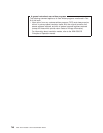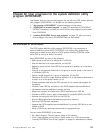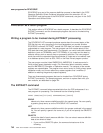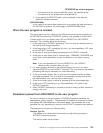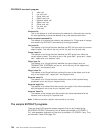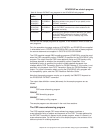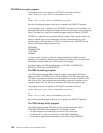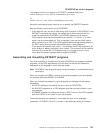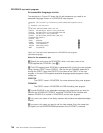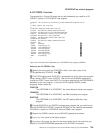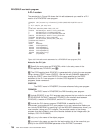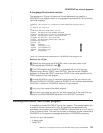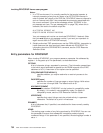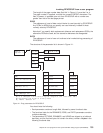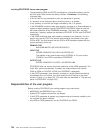The program must be run against an EXTRACT command of the form:
EXTRACT GROUP(group name) OBJECTS USERPROGRAM(program-name)
or:
EXTRACT LIST(list name) OBJECTS USERPROGRAM(program-name)
Note that the sample program requires you to specify the OBJECTS keyword.
Note the following points when using DFH0CBDC:
v It can deal with only one set of data during each invocation of DFHCSDUP; if two
EXTRACT commands are issued, the second set of data overwrites the first.
v In the file produced by DFH0CBDC, any DEFINE statements that relate to
CICS-supplied resources are preceded by an asterisk (*) in column 1; in other
words, they are commented out. This is important if you use the file as input to
define resources to a CSD. (The CICS-supplied definitions are already present in
the CSD, having been produced automatically when it was initialized.)
v If you remove an asterisk from column 1 (to reinstate the DEFINE statement), do
so by deleting it, not by overtyping it with a blank. This ensures that the resulting
command is no more than 72 characters long; if it is longer than this, errors
occur when the output is passed back through DFHCSDUP.
Assembling and link-editing EXTRACT programs
You must assemble (or compile) and link-edit DFHCSDUP user programs as batch
programs, not as CICS applications, and you need link-edit control statements
appropriate to the language in which they are written.
Note: DFHCSDUP user programs should not be translated, or unpredictable results
could occur.
When you compile the COBOL versions of the sample programs, you must specify
the compiler attributes NORENT and NORES.
When you link-edit the programs, you must specify the following link-edit control
statements:
v An ENTRY statement that defines the entry name as DFHEXTRA
v An INCLUDE statement for a CICS-supplied stub that must be included in your
user program
v A CHANGE statement to change the dummy CSECT name in the CICS-supplied
stub from EXITEP to the name of your user program.
These requirements are explained in more detail for each of the languages
(assembler, VS COBOL II, and PL/I ) shown in the following sample job streams.
DFHCSDUP as a batch program
Chapter 30. User programs for the system definition utility program (DFHCSDUP) 747




